NX二次开发:Checkmate例子根据dfa文件检查模型数据
NX中的checkmate功能是用于检查模型、图纸数据的工具,在UGOPEN中有例子。手动操作可以检查已加载的装配下所有零部件,可以设置通过后保存模型,检查结果保存到Teamcenter中,默认保存在零组件版本下。
代码中可以设置多个检查规则。相关设置可以在用户默认设置中进行设置。
1 //============================= 2 // Checkmate例子 3 //============================= 4 // Mandatory UF Includes 5 #include <uf.h> 6 #include <uf_object_types.h> 7 #include <uf_draw.h> 8 #include <uf_part.h> 9 #include <uf_ugmgr.h> 10 #include <uf_ui.h> 11 #include <uf_obj.h> 12 #include <uf_drf.h> 13 14 // Std C++ Includes 15 #include <iostream> 16 #include <sstream> 17 #include <vector> 18 #include <string> 19 #include <algorithm> 20 #include <tchar.h> 21 #include <atlconv.h> 22 #include <shellapi.h> 23 24 // check mate 25 #include <NXOpen/Validate_ValidationManager.hxx> 26 #include <NXOpen/Validate_Validator.hxx> 27 #include <NXOpen/Validate_ValidatorOptions.hxx> 28 #include <NXOpen/Validate_Parser.hxx> 29 30 #include <windows.h> 31 #undef CreateDialog 32 #pragma comment(lib,"shell32.lib") 33 34 using namespace NXOpen; 35 using std::string; 36 using std::exception; 37 using std::stringstream; 38 using std::endl; 39 using std::cout; 40 using std::cerr; 41 42 int ExecuteCheckerAndGetResults(); 43 44 extern "C" DllExport void ufusr( char *parm, int *returnCode, int rlen ) 45 { 46 try 47 { 48 UF_CALL(UF_initialize()); 49 50 ExecuteCheckerAndGetResults(); 51 52 UF_CALL(UF_terminate()); 53 } 54 catch (const NXException& e1) 55 { 56 UI::GetUI()->NXMessageBox()->Show("NXException", NXOpen::NXMessageBox::DialogTypeError, e1.Message()); 57 } 58 catch (const exception& e2) 59 { 60 UI::GetUI()->NXMessageBox()->Show("Exception", NXOpen::NXMessageBox::DialogTypeError, e2.what()); 61 } 62 catch (...) 63 { 64 UI::GetUI()->NXMessageBox()->Show("Exception", NXOpen::NXMessageBox::DialogTypeError, "Unknown Exception."); 65 } 66 } 67 68 extern "C" DllExport int ufusr_ask_unload() 69 { 70 return (int)NXOpen::Session::LibraryUnloadOptionImmediately;// 调试用 71 //return (int)NXOpen::Session::LibraryUnloadOptionAtTermination;// 程序发布用 72 //return (int)NXOpen::Session::LibraryUnloadOptionExplicitly; 73 } 74 75 int ExecuteCheckerAndGetResults() 76 { 77 // Get the NX session, work part, display part. 78 Session *theSession = Session::GetSession(); 79 Part *workPart(theSession->Parts()->Work()); 80 Part *displayPart(theSession->Parts()->Display()); 81 82 // Get the NX Check-Mate Validator object. 83 std::vector<Validate::Validator *> validators1; 84 theSession->ValidationManager()->FindValidator("Check-Mate", validators1); 85 86 // Get the NX Check-Mate ValidatorOptions, and set options. 87 Validate::ValidatorOptions *validatorOptions1; 88 validatorOptions1 = validators1[0]->ValidatorOptions(); 89 90 validatorOptions1->SetSkipChecking(false); 91 validatorOptions1->SetSkipCheckingDontLoadPart(false); 92 validatorOptions1->SetSaveResultInTeamcenter(Validate::ValidatorOptions::SaveModeTypesSaveIfPassed); 93 validatorOptions1->SetSavePartFile(Validate::ValidatorOptions::SaveModeTypesSaveIfPassed); 94 validatorOptions1->SetSaveResultInPart(false); 95 96 // 2023_0328 97 validatorOptions1->SetAutoDisplayResults(Validate::ValidatorOptions::ResultsDisplayModeTypesAlwaysDisplay); 98 validatorOptions1->SetExcludeNonOwnerParts(true); 99 validatorOptions1->SetExcludeReadonlyParts(true); 100 validatorOptions1->SetGenerateCheckFlag(false); 101 validatorOptions1->SetGenerateLogFile(false); 102 validatorOptions1->SetStopOnError(false); 103 validatorOptions1->SetStopOnWarning(false); 104 // 2023_0328 105 106 // Clear part nodes if any. 107 validators1[0]->ClearPartNodes(); 108 109 // Appends the full path of a part file or the current work part. 110 validators1[0]->AppendPartNode(workPart); 111 112 // Manually add this line to clean all existing tests 113 validators1[0]->ClearCheckerNodes(); 114 115 // Select a checker and append it into the Validator object. 116 std::vector<NXString> classnames1(2); 117 classnames1[0] = "%mqc_report_browseable_features";//mqc_profile_modeling_cn.dfa 118 classnames1[1] = "%mqc_profile_modeling_cn";//mqc_profile_modeling_cn.dfa 119 validators1[0]->AppendCheckerNodes(classnames1); 120 121 // Execute the Check-Mate checker. 122 Validation::Result status1; 123 status1 = validators1[0]->Commit(); 124 125 // Get a Parser object, and show the checker result. 126 std::vector<Validate::Parser *> parsers1; 127 theSession->ValidationManager()->FindParser("Validation Gadget", parsers1); 128 parsers1[0]->ClearResultObjects(); 129 parsers1[0]->SetDataSource(Validate::Parser::DataSourceTypesMostRecentRun); 130 parsers1[0]->SetMaxDisplayObjects(10); 131 parsers1[0]->Commit(); 132 133 return 0; 134 }
设置、保存后、用户默认设置截图:
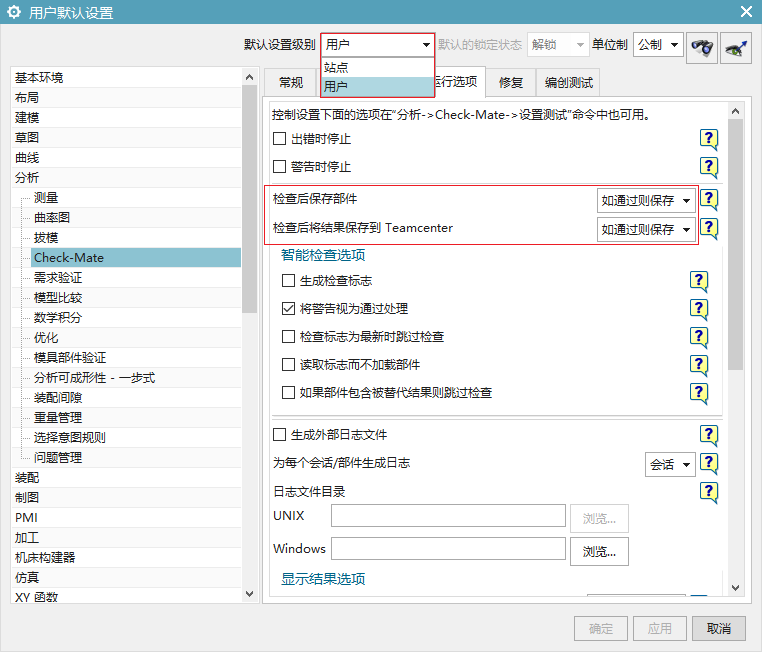
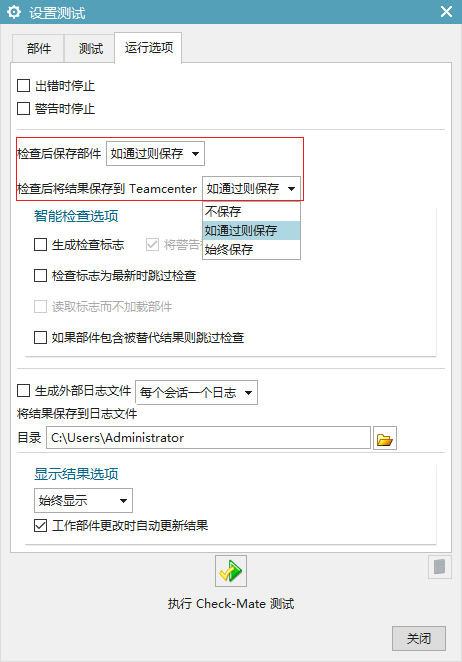
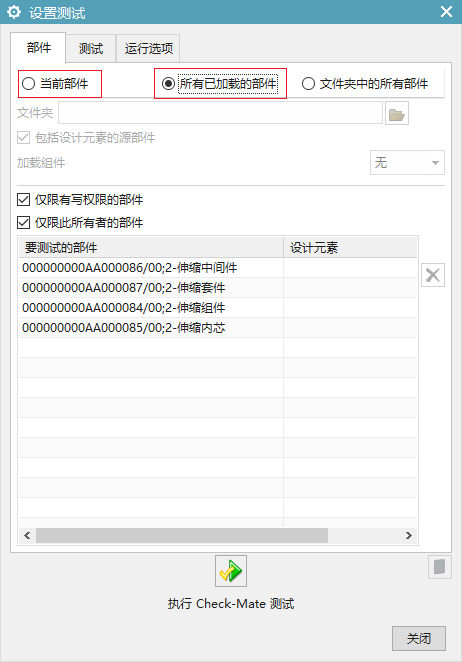
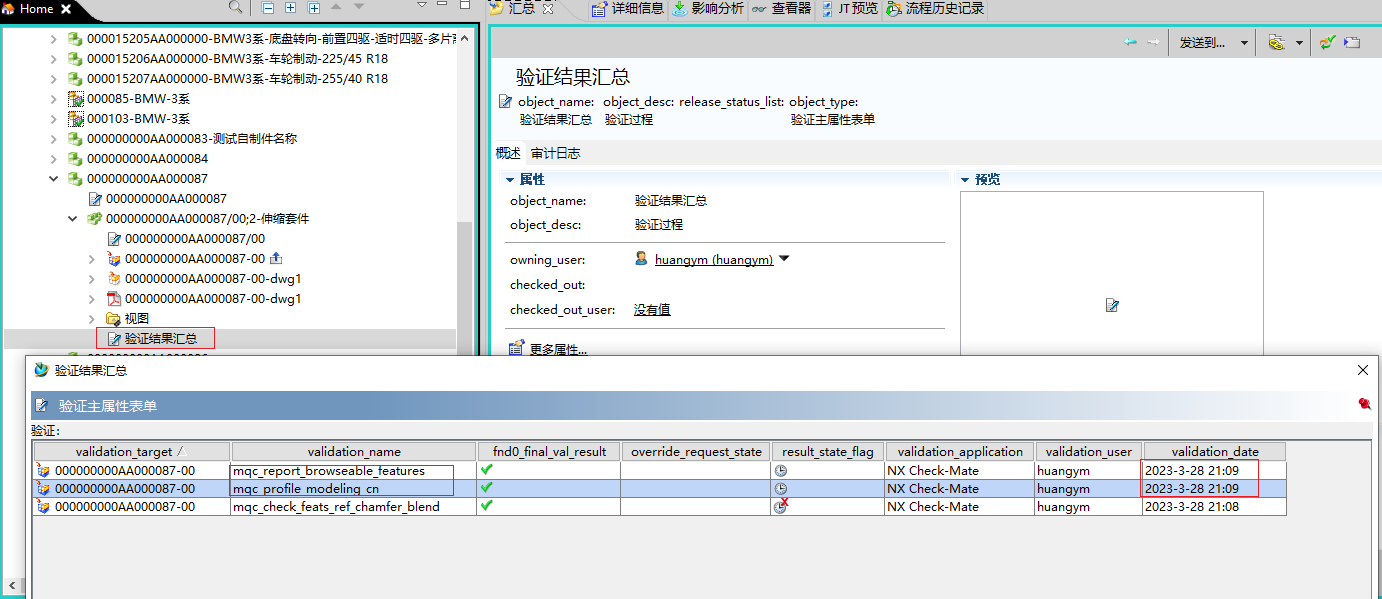
调试GIF动态图:
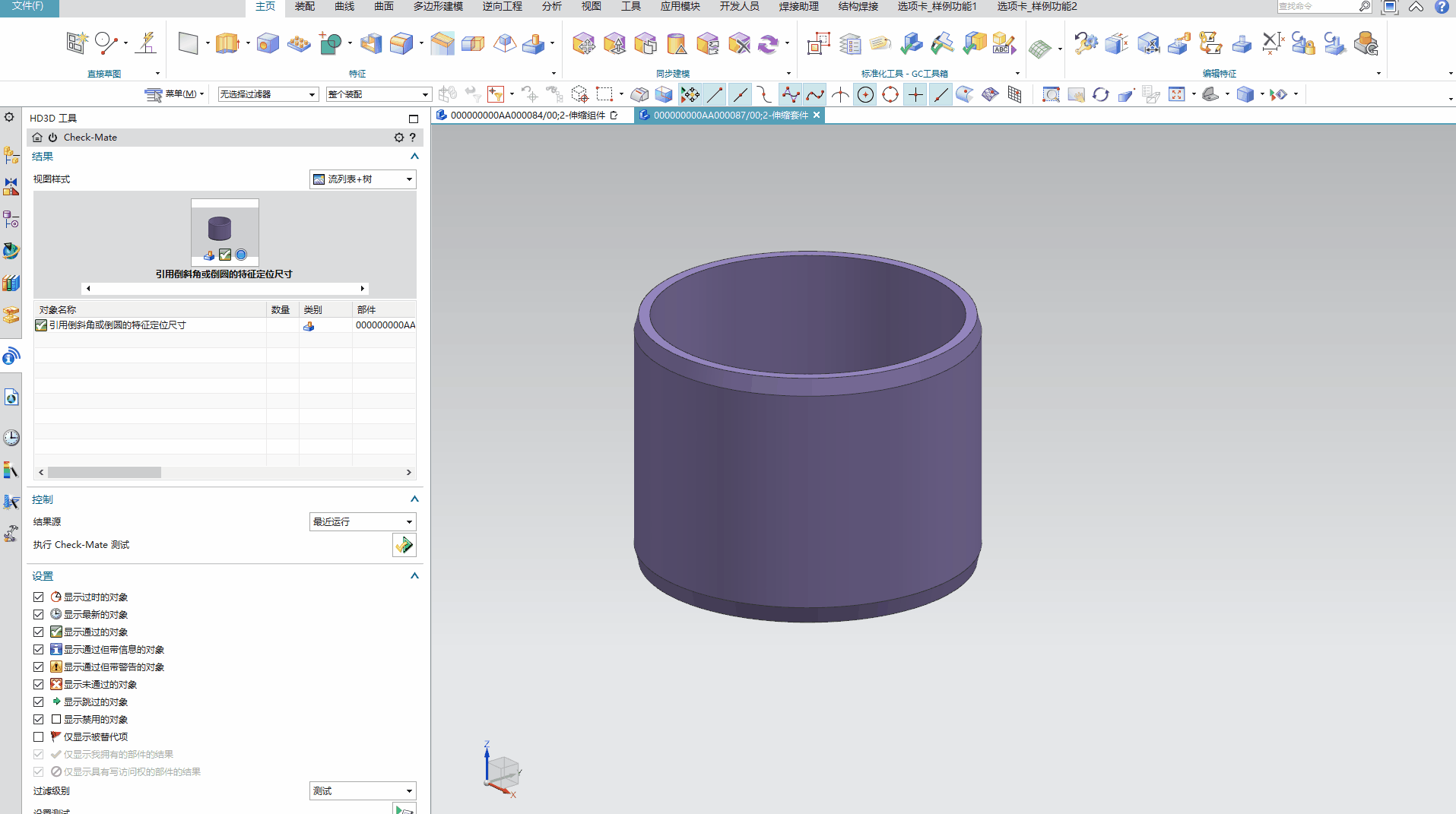
黄河远上白云间,一片孤城万仞山。
羌笛何须怨杨柳,春风不度玉门关。
诗人初到凉州,面对黄河、边城的辽阔景象,又耳听着《折杨柳》曲,有感而发,写成了这首表现戍守边疆的士兵思念家乡情怀的诗作。
诗的前两句描绘了西北边地广漠壮阔的风光。首句抓住自下(游)向上(游)、由近及远眺望黄河的特殊感受,描绘出“黄河远上白云间”的动人画面:汹涌澎湃波浪滔滔的黄河竟像一条丝带迤逦飞上云端。写得真是神思飞跃,气象开阔。诗人的另一名句“黄河入海流”,其观察角度与此正好相反,是自上而下的目送;而李白的“黄河之水天上来”,虽也写观望上游,但视线运动却又由远及近,与此句不同。“黄河入海流”和“黄河之水天上来”,同是着意渲染黄河一泻千里的气派,表现的是动态美。而“黄河远上白云间”,方向与河的流向相反,意在突出其源远流长的闲远仪态,表现的是一种静态美。同时展示了边地广漠壮阔的风光,不愧为千古奇句。





